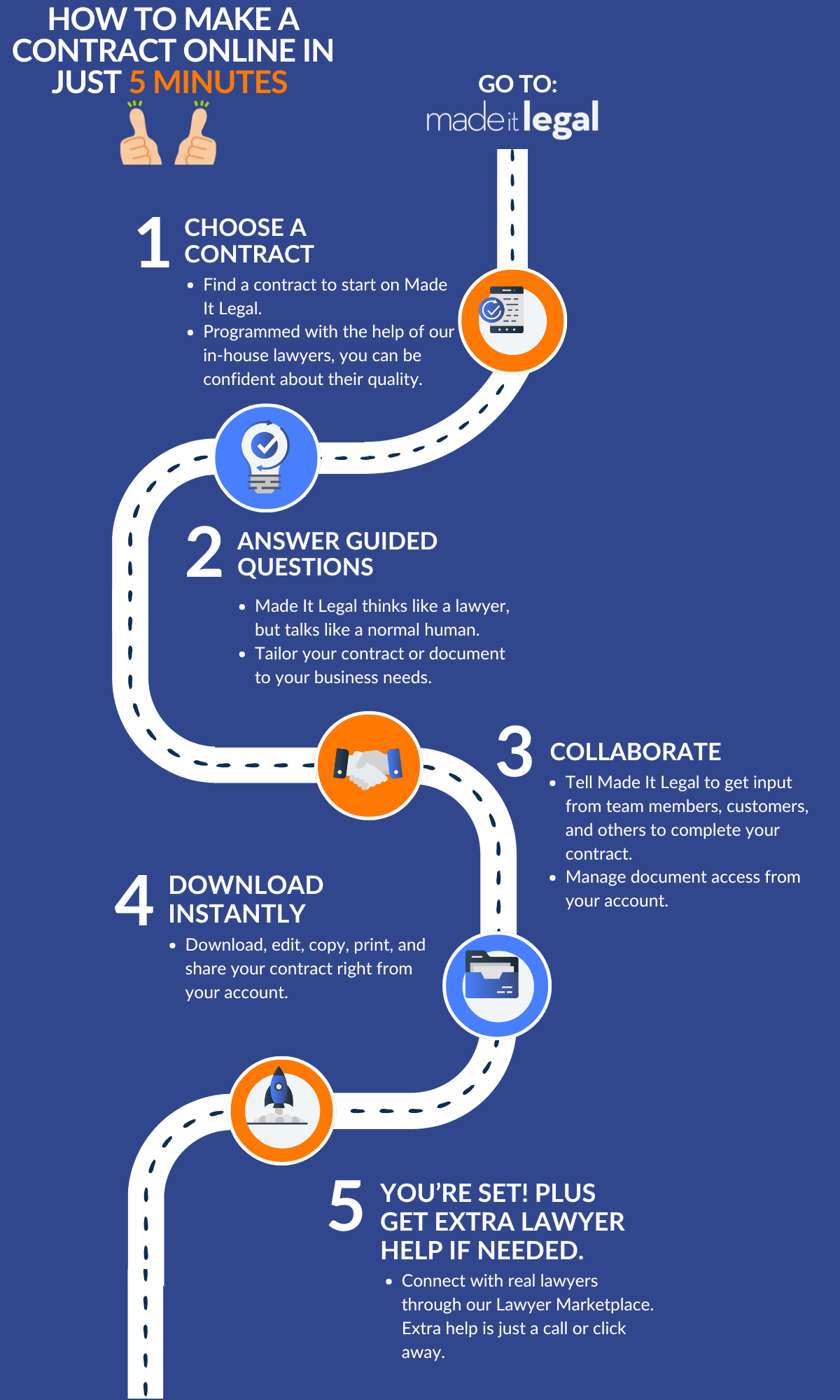Make a Legal Document For...
(It's Free to Start One)
- Products & Services
- Software & Apps
- Protecting Ideas
- Websites
- Hiring Employees & Contractors
- Investors & Financing your Business
- Founders & Starting a Business
- Collaborating, Referring, and Reselling
- Disclaimers, Releases, & Waivers

Master Services Agreement
for multi-phased projects or services
A Master Services Agreement is meant for phased project work and includes a Statement of Work. Each new phase of an ongoing project or any new project you start will have different services completed and different payment amounts, timelines, and other conditions. So, rather than signing up a whole new contract each time, the new project or phase gets a Statement of Work with the details specific to it. That Statement of Work then becomes part of the master terms and conditions in the (you guessed it) Master Services Agreement.
Examples of companies that use a Master Services Agreement include website developers, software developers, and other project-based services companies.
Master Services Agreement Example
A software developer might use a Master Services Agreement because the app being worked on will be developed over several phases. The first phase might be beta testing, the second a minimum viable version of the app for user testing, and the third phase the actual market launch with full features. Each phase will have different work to be done and so a new Statement of Work for each phase describes the work, payment terms, timelines, and other specifics of that phase. The first Statement of Work will cover the beta testing, and the second Statement of Work covers the minimum viable product version, and so on until all the phases are completed.
Statement of Work
to start a new project or phase under your Master Services Agreement
A Statement of Work goes along with your Master Services Agreement. If you’re unfamiliar with Master Services Agreement, be sure to read the description above first. A Statement of Work describes the work being done for a phase of your project, how much it will cost, key timelines and deadlines for the work being done right now, and other important parts of the project. When you start a new phase of your project or services, you do up another Statement of Work, and so on until the project is complete.
Services Agreement
for one-time services or longer relationships where the services stay mostly the same
Service-based companies – like consultants, freelancers, independent contractors, website designers, marketers, and other service businesses – use a Services Agreement to sell their services to their clients. A Services Agreement is meant for one-time deliverables or for longer term services relationships where the type of services stay mostly the same. For example, a content writer could be hired to write a single article or they could be hired to write ongoing blog, marketing, and other content for a company.
Consultant Agreement
to hire someone as a consultant
Use a Consultant Agreement to hire a consultant for some work or a project. Consultant Agreements are a type of services agreement.
Independent Contractor Agreement
to hire someone as a contractor
Companies often hire people as independent contractors instead of employees. Maybe the person will be a temporary member of your team or they’ll work for other companies too and so it doesn’t make sense for them to be an employee right now. Whatever the reason, this type of services agreements is customized for a worker joining your team as an independent contractor.
Services Terms & Conditions
to attach to your customer order form
Your Services Terms & Conditions have all the “fine print” legal stuff you need, like your disclaimers, return policy (if any), and ownership of intellectual property. You attach your Services Terms & Conditions to an order form or invoice. They’re meant for short service projects or one-time sales, like creating a logo, doing a voice-over audio file, selling digital assets like an explainer video, or repairing some equipment.
E-commerce Sales Terms & Conditions
to use with your online store
Online stores and e-commerce companies use Sales Terms & Conditions when they sell their products online. Your Sales Terms and Conditions (or just “T&Cs” for short) include things like your warranty and refund policies, shipping terms, product disclaimers, and other legal “fine print”.
Data Processing Agreement
about how businesses may use personal information
In privacy law, there are data controllers and data processors. A data controller could be the individual (sometimes called the “data subject”) or it could be a company that holds the personal information and is sharing it with another company. The controller is the person or business that controls how the information can be used. A data processor is a business that uses the personal information on behalf of the controller for some purpose.
A Data Processing Agreement is a contract between a data controller and a data processor about how the information can be used. In some areas, like in Europe where GDPR (the General Data Protection Regulation) applies, a Data Processing Agreement may be mandatory.

SaaS Terms of Service
for your software-as-a-service (Saas) platform
Acceptable Use Policy
to say what's acceptable use of your SaaS platform or app by customers, service providers, and authorized users
As a software-as-a-service (SaaS) company or app provider, you sell access to your platform to your customers. Those customers will have their own authorized users, which are their employees or independent contractors that will be using your SaaS platform or app on behalf of the customer. You may also have service providers working on your SaaS platform or app, such as independent software developers or designers. An Acceptable Use Policy tells these people how they are allowed to use your software platform or app, such as not using it to build a competing product, tampering with its security, or violating copyright.
Service Level Agreement
to give support services to your SaaS customers
API Terms of Use
for allowing use of your API
End User License Agreement (EULA)
for your iPhone, Android, or other mobile app
Software License Agreement
for software licensed to your customer for use on their systems
Data Processing Agreement
about how businesses may use personal information
In privacy law, there are data controllers and data processors. A data controller could be the individual (sometimes called the “data subject”) or it could be a company that holds the personal information and is sharing it with another company. The controller is the person or business that controls how the information can be used. A data processor is a business that uses the personal information on behalf of the controller for some purpose.
A Data Processing Agreement is a contract between a data controller and a data processor about how the information can be used. In some areas, like in Europe where GDPR (the General Data Protection Regulation) applies, a Data Processing Agreement may be mandatory.
Source Code Escrow Agreement
to give access to source code with conditions
In a software relationship, there is a licensor (the owner of the software) and a licensee (the customer using the software). Both parties want to be protected. The licensor wants its intellectual property to be secure. The licensee wants to know that if the licensor goes bankrupt or stops meeting its obligations under the software license agreement (the agreement that gives the licensee access to the software), it can continue to use the software.
A source code escrow agreement is the answer. An independent agent (called an “escrow agent”) holds the software source code and can only give it to the licensee if a specified event occurs, like the licensor becoming bankrupt or defaulting on its obligations under the software license agreement.
Reseller Agreement
to make someone an authorized reseller of your software
A Reseller is someone that sell subscriptions to your Software-as-a-service (SaaS) platform or app to your potential customers. The Reseller can get a commission on sales or can make a margin on the purchase price charged to a customer. Your Reseller Agreement will also say if the Reseller is responsible for customer onboarding, training, and other services.
Referral Terms & Conditions
to encourage existing customers to refer new customers to you

Confidentiality Agreement
to protect your confidential information when you share it
A Confidentiality Agreement (also called a Non-Disclosure Agreement or “NDA”) lets you share your ideas and information with someone else by making them promise to keep the information confidential. It also says that anything made through your confidential information becomes your property, unless you agree otherwise.

Website Terms of Use
to tell website visitors how they are allowed to use your site
Website Terms of Use tell your visitors how they are allowed to use your website. They also protect your copyright to your site and other intellectual property. They also include legal notices and disclaimers to limit your liability.
Privacy Policy
to explain how you collect, use, and share personal information
A Privacy Policy tells website visitors, customers, and others what personal information you collect, when you collect it, how and why you use it, and who you may share it with. It also includes mandatory privacy legal notices and statements to make sure you’re meeting privacy law requirements.
Cookies Policy
to explain how you use tracking technologies
A Cookies Policy tells website visitors, customers, and others how you track their use of your website through cookies and other tracking technologies.
Data Processing Agreement
about how businesses may use personal information
In privacy law, there are data controllers and data processors. A data controller could be the individual (sometimes called the “data subject”) or it could be a company that holds the personal information and is sharing it with another company. The controller is the person or business that controls how the information can be used. A data processor is a business that uses the personal information on behalf of the controller for some purpose.
A Data Processing Agreement is a contract between a data controller and a data processor about how the information can be used. In some areas, like in Europe where GDPR (the General Data Protection Regulation) applies, a Data Processing Agreement may be mandatory.
E-commerce Sales Terms & Conditions
to use with your online store
Online stores and e-commerce companies use Sales Terms & Conditions when they sell their products online. Your Sales Terms and Conditions (or just “T&Cs” for short) include things like your warranty and refund policies, shipping terms, product disclaimers, and other legal “fine print”.

Employment Contract
to hire an employee
Independent Contractor Agreement
to hire someone as a contractor
Companies often hire people as independent contractors instead of employees. Maybe the person will be a temporary member of your team or they’ll work for other companies too and so it doesn’t make sense for them to be an employee right now. Whatever the reason, this type of services agreements is customized for a worker joining your team as an independent contractor.
Consultant Agreement
to hire someone as a consultant
Use a Consultant Agreement to hire a consultant for some work or a project. Consultant Agreements are a type of services agreement.
Sales Representative Agreement
for employee or contractor sales representatives
Use a Sales Representative Agreement when hiring a person to sell your products or services. You can choose to hire the person as an employee or as a contractor.
Master Services Agreement
for multi-phased projects or services
A Master Services Agreement is meant for phased project work and includes a Statement of Work. Each new phase of an ongoing project or any new project you start will have different services completed and different payment amounts, timelines, and other conditions. So, rather than signing up a whole new contract each time, the new project or phase gets a Statement of Work with the details specific to it. That Statement of Work then becomes part of the master terms and conditions in the (you guessed it) Master Services Agreement.
Examples of companies that use a Master Services Agreement include website developers, software developers, and other project-based services companies.
Master Services Agreement Example
A software developer might use a Master Services Agreement because the app being worked on will be developed over several phases. The first phase might be beta testing, the second a minimum viable version of the app for user testing, and the third phase the actual market launch with full features. Each phase will have different work to be done and so a new Statement of Work for each phase describes the work, payment terms, timelines, and other specifics of that phase. The first Statement of Work will cover the beta testing, and the second Statement of Work covers the minimum viable product version, and so on until all the phases are completed.

Subscription Agreement
to bring on new investors in your business
Use a Subscription Agreement to sell shares in your business to an investor or new shareholder. If your business is set up as a partnership, you can use the same agreement to sell units in your partnership to new partners.
Shareholder Loan Agreement
for loans by a shareholder or owner to the business
Use a Shareholder Loan Agreement to lend money from you or another shareholder to your business. Your business acknowledges the debt and promises to repay the amount. You can choose to make the loan interest or interest-free, include a repayment schedule or have the amount payable on demand, and include other loan features.
SAFE (Simple Agreement for Future Equity)
to raise money from investors
Early stage companies use a “SAFE” (Simple Agreement for Future Equity) to raise money from investors. The money from the investor can be converted into equity (shares in the corporation or units in a partnership) if the company successfully does a large financing round in the future. To reward the SAFE investors for their early bet on the company, they get a discount on the share price offered in the future equity round. This gives the SAFE investors an immediate return on their investment. SAFEs are very similar to Convertible Notes but are different in one really important way – they’re not a loan, so they’re not debt and usually there is no repayment obligation.
Convertible Note
to raise money from investors
Early stage companies use a Convertible Note to raise money from investors. The Convertible Note is a loan from the investor that can be repaid or converted later into equity (e.g., shares in the business) rather than being repaid. Often, to reward the investors for their early bet on the company, they get a discount on the share price offered in the future equity round. This gives the Convertible Notes investors an immediate return on their investment.
Promissory Note
for simple loans from anyone
Guarantor Indemnity Agreement
for reimbursing someone that has guaranteed a debt or obligation
A guarantor is someone that promises to pay a creditor if the company does not. So if your company borrows money and you guarantee it, you’ll pay if the company misses a payment. A guarantor indemnity agreement is a promise by the company to the guarantor to repay them if the guarantee is triggered.
Sometimes several people guarantee the company’s loan. For example, the founders could all guarantee the company’s bank loan. You’d think that when several people guarantee a bank loan, lease, or some other obligation, the creditor would have to collect the fair share from each person if the company doesn’t pay the obligation. But that’s not how it works. The creditor can go after one or more of the people as it sees fit, usually going after the ones that actually have the money to pay. A Guarantor Indemnity Agreement solves that problem by making an agreement among all the guarantors that they will reimburse anyone who pays more than their fair share.

Unanimous Shareholder Agreement
the main agreement between founders and owners of a business
Founders and shareholders use a Unanimous Shareholder Agreement (sometimes called a “USA”) to create the rules of their business relationship. The agreement covers things like who gets to buy new shares, how profits are shared, confidentiality, selling the company, paying dividends, and how major business decisions will be made.

Legal Documents for Collaborating, Referral Sharing, and Reselling with other Businesses
If you’re a business collaborating with another, exchanging referrals, or even reselling each other’s products or services, then you’ve come to the right place to find agreements to say how you will work together.
Referral Agreement
to make an agreement with another business about referring customers and prospects
Referral Terms & Conditions
to encourage existing customers to refer new customers to you
Reseller Agreement
to make someone an authorized reseller of your software
A Reseller is someone that sell subscriptions to your Software-as-a-service (SaaS) platform or app to your potential customers. The Reseller can get a commission on sales or can make a margin on the purchase price charged to a customer. Your Reseller Agreement will also say if the Reseller is responsible for customer onboarding, training, and other services.
Letter of Intent
to sketch out the main points of a future agreement

Release of Claims
to release someone from an existing legal claim
Waiver of Liability
to prevent liability for potential future claims
Disclaimers
to give a legal notice limiting your liability
Disclaimers limit your liability in important ways. For example, a business may have a disclaimer that it’s not liable if its customers fail to follow the instructions given with the product. Companies making a pitch to investors should have a “forward looking statements” disclaimer on their financial projections to say that the projections are not guarantees of the company’s future performance. Disclaimers are important legal notices for many situations.

Join our mailing list for free legal tips
Legal insights for entrepreneurs and businesses, without a bill. Unsubscribe anytime.
Example Return on Investment
(ROI) Calculation

Getting a contract for your business
Old Way
Lawyer time estimate: 5 hours
Lawyer rate: $400/hour
Turnaround time: 1 week
$2,000
Cost
Made It Legal Way
Document fee: $39
Extra lawyer help (optional):$400/hour for 1 hour
Time:As little as 5 minutes
min $39 – max $439
Cost
356% Return on Investment
up to $1,961 Potential Savings
Click for calculation details*
With Made It Legal, you can make your own customized legal document for as little as $39. If you need extra help from a lawyer to negotiate your agreement or to make a special edit to it, we can connect you with one through our Made It Lawyer Marketplace.
Let’s say your lawyer needs just 1 hour to make your requested changes or to negotiate the last point with your customer and they charge $400/hour. Instead of paying for 5 hours for the lawyer to start from the beginning and write your whole contract, you’ve only had to pay for the 1 hour you actually needed.
So, with the $39 for making the document with Made It Legal plus the 1 hour of lawyer time, you’ve spent $439 instead of 5 hours x 400 = $2,000.
You’ve now saved $1,561 and that’s a 356% return on your cost with Made It Legal ($1,561 saved / $429 spent = 356%).
With the savings, you can invest back into your business or pay yourself a nice bonus for being ridiculously smart with your money.
* illustration only
Click for calculation details*
With Made It Legal, you can make your own customized legal document for as little as $39. If you need extra help from a lawyer to negotiate your agreement or to make a special edit to it, we can connect you with one through our Made It Lawyer Marketplace.
Let’s say your lawyer needs just 1 hour to make your requested changes or to negotiate the last point with your customer and they charge $400/hour. Instead of paying for 5 hours for the lawyer to start from the beginning and write your whole contract, you’ve only had to pay for the 1 hour you actually needed.
So, with the $39 for making the document with Made It Legal plus the 1 hour of lawyer time, you’ve spent $439 instead of 5 hours x 400 = $2,000.
You’ve now saved $1,561 and that’s a 356% return on your cost with Made It Legal ($1,561 saved / $429 spent = 356%).
With the savings, you can invest back into your business or pay yourself a nice bonus for being ridiculously smart with your money.
Why us?



